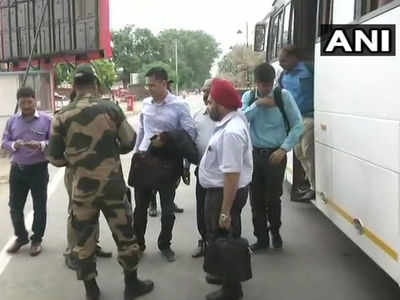- News
- India News
- Indian delegation reaches Pak to hold talks on Indus Waters Treaty
Trending
This story is from August 28, 2018
Indian delegation reaches Pak to hold talks on Indus Waters Treaty
The Indian delegation will hold talks with its counterpart on August 29-30. While India has justified the water talks in the past as a "mandatory requirement" under the Indus Waters Treaty (IWT), the timing of the meeting on this occasion is significant as it will come just days after Imran Khan took over as Pakistan PM.

Key Highlights
- The timing of the meeting is significant as it will come just days after Imran Khan took over as Pakistan PM
- India has justified the water talks in the past as a 'mandatory requirement' under the Indus Waters Treaty
NEW DELHI: A nine-member Indian delegation reached Pakistan on Tuesday to attend the Permanent Indus Water Commission meet.
The delegation led by Indian Commissioner for Indus Waters PK Saxena will hold talks with its counterpart on August 29-30. Pakistan Water Commissioner Syed Mehr Ali Shah and additional commissioner Sheraz Jamil received the Indian delegation in Lahore.
While India has justified the water talks in the past as a "mandatory requirement" under the Indus Waters Treaty (IWT), the timing of the meeting on this occasion is significant as it will come just days after Imran Khan took over as PM.
Besides the 330 MW project on the Kishanganga river (tributary of Jhelum), India's 850 mw Ratle run-of-river hydroelectric project, too, has been a bone of contention between the two countries for long. Ratle is being built on the Chenab river in Kishtwar district of J&K.
The last meeting of the Permanent Indus Commission was held in New Delhi in March when both the countries had shared details of water flow and the quantum of water being used under the treaty.
Despite both sides wanting "constructive" engagement, any comprehensive dialogue is ruled out for now. Meetings on the Indus waters and also engagement on the sidelines of multilateral events are being considered by India as these involve little risk of undermining its official position that there can be no substantive engagement with Islamabad until it acts against India-specific terror groups.
The delegation led by Indian Commissioner for Indus Waters PK Saxena will hold talks with its counterpart on August 29-30. Pakistan Water Commissioner Syed Mehr Ali Shah and additional commissioner Sheraz Jamil received the Indian delegation in Lahore.
While India has justified the water talks in the past as a "mandatory requirement" under the Indus Waters Treaty (IWT), the timing of the meeting on this occasion is significant as it will come just days after Imran Khan took over as PM.
Besides the 330 MW project on the Kishanganga river (tributary of Jhelum), India's 850 mw Ratle run-of-river hydroelectric project, too, has been a bone of contention between the two countries for long. Ratle is being built on the Chenab river in Kishtwar district of J&K.
Though water of eastern rivers (Ravi, Beas and Sutlej) are allocated to India under the 1960 IWT, the country is under obligation to let the water of western rivers (Indus, Jhelum and Chenab) flow to Pakistan. India is, however, permitted to construct hydroelectric projects on the western rivers and can even use the water from these rivers for irrigation and other domestic purposes.
The last meeting of the Permanent Indus Commission was held in New Delhi in March when both the countries had shared details of water flow and the quantum of water being used under the treaty.
Despite both sides wanting "constructive" engagement, any comprehensive dialogue is ruled out for now. Meetings on the Indus waters and also engagement on the sidelines of multilateral events are being considered by India as these involve little risk of undermining its official position that there can be no substantive engagement with Islamabad until it acts against India-specific terror groups.
End of Article
FOLLOW US ON SOCIAL MEDIA










